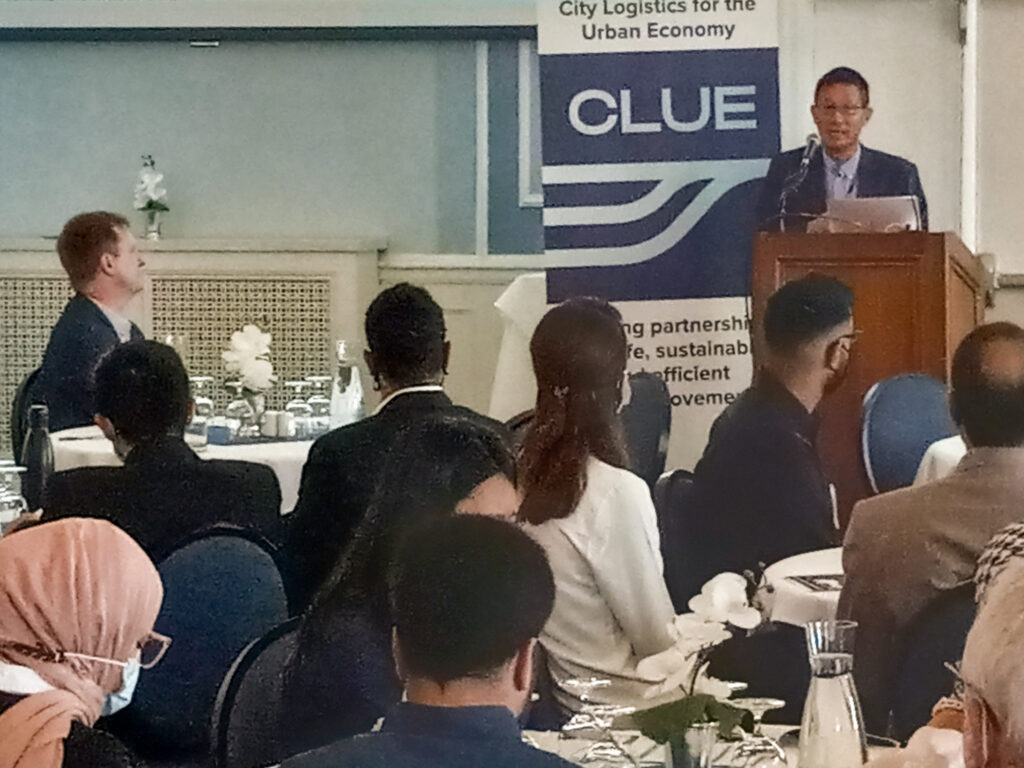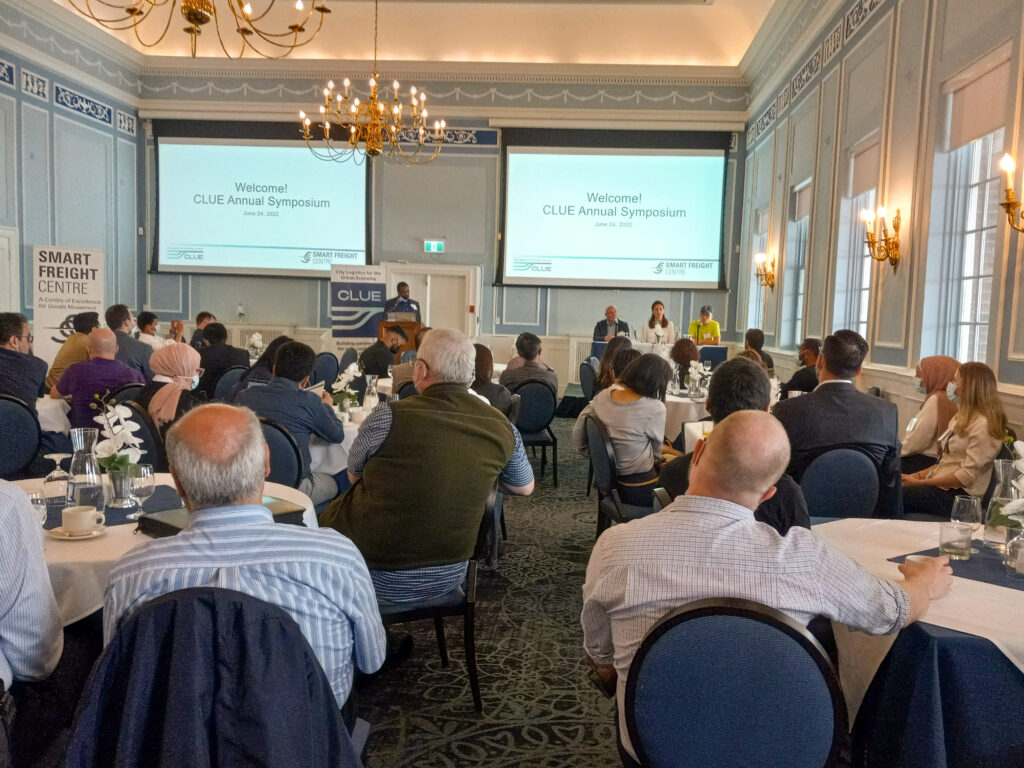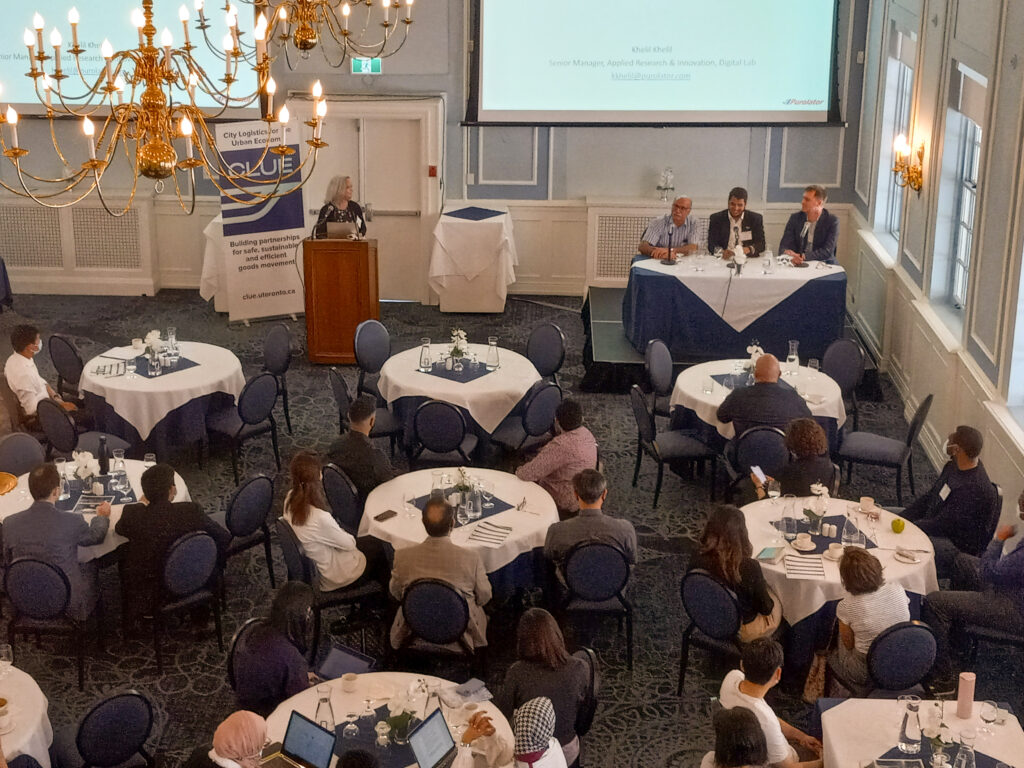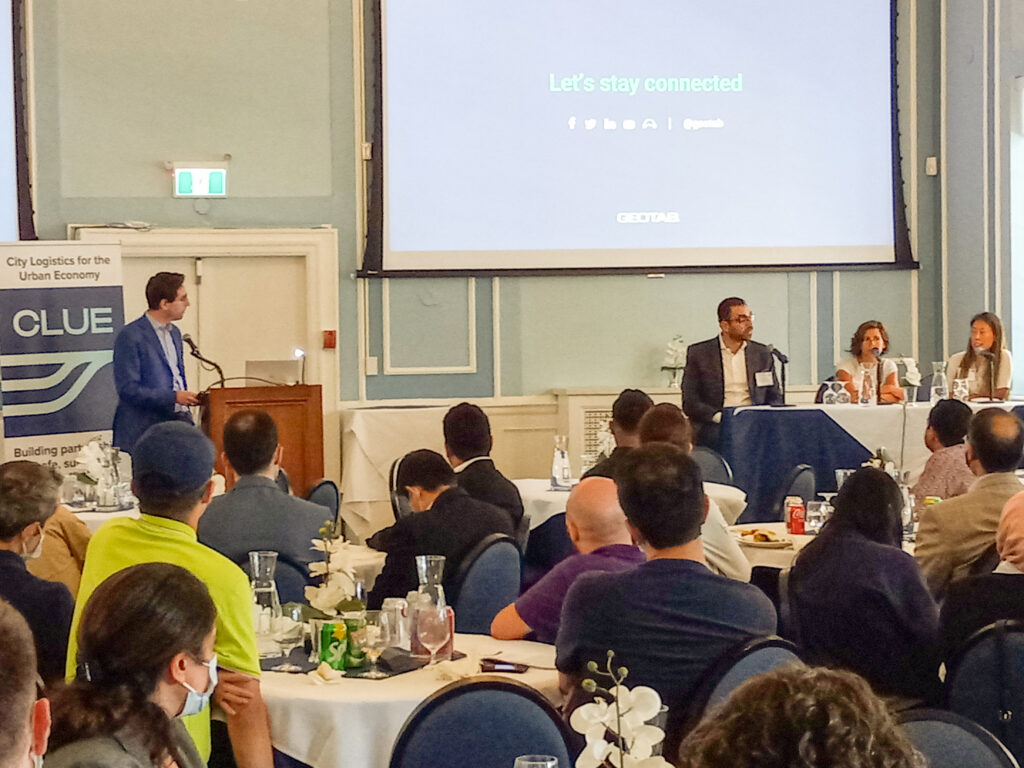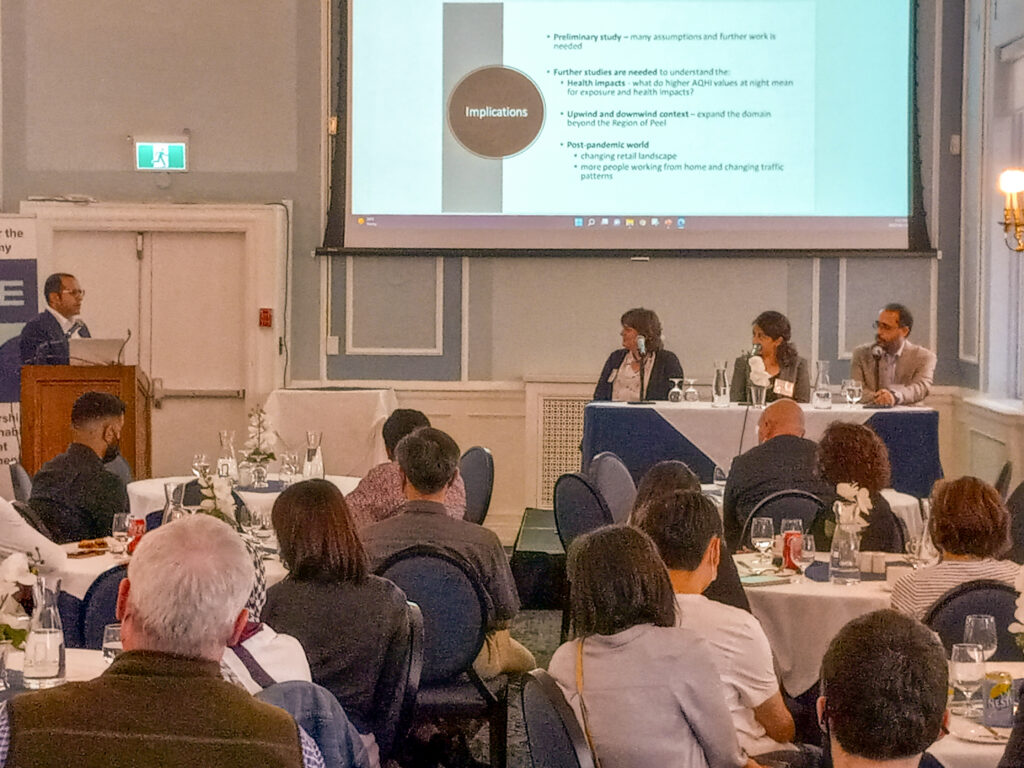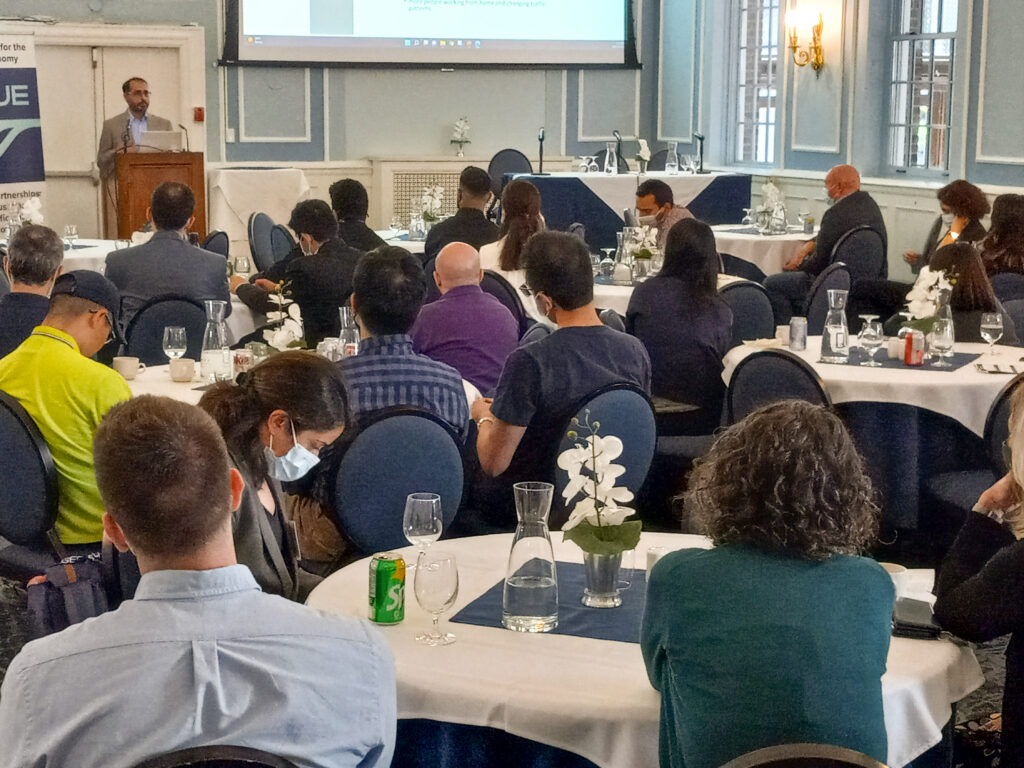The CLUE 2022 Symposium: Live & in-person
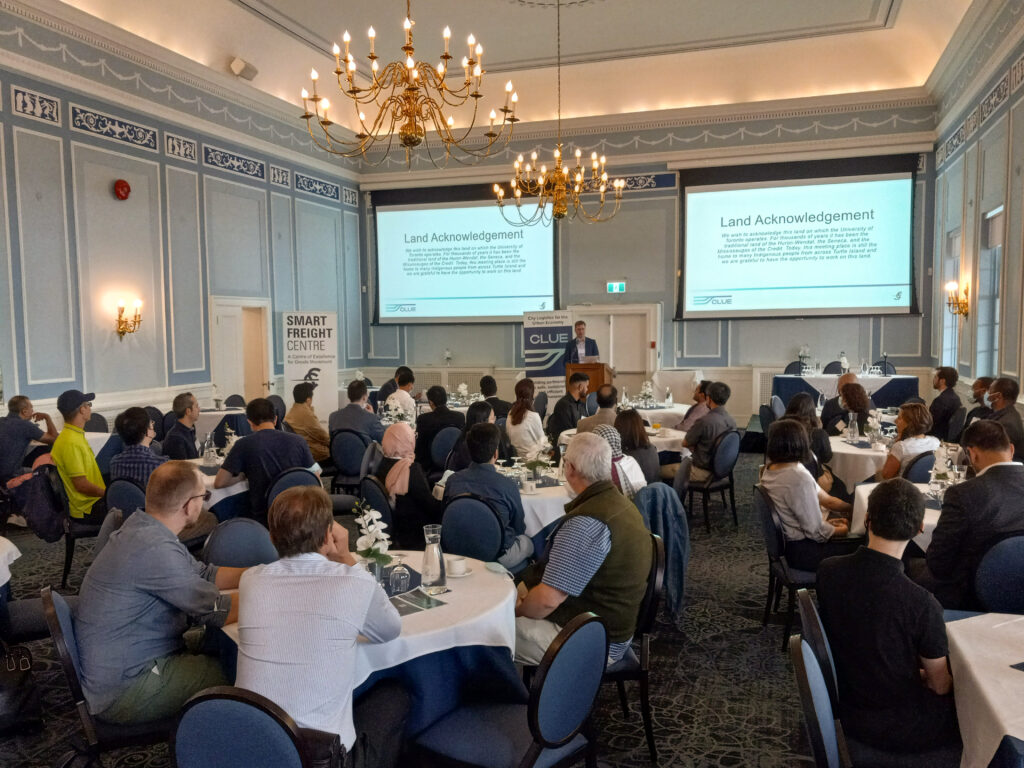
For most, if not all attendees, the CLUE 2022 Symposium on June 24, 2022 was one of the first in-person events since the advent of COVID-19 pandemic restrictions in 2020. As such, the air of celebration at this invitation-only gathering at the University of Toronto’s historic Faculty Club was palpable. The fact that it was City Logistics for the Urban Economy’s inaugural symposium and first opportunity to widely share and discuss the project’s research added to the pride in accomplishment and optimism about CLUE’s future achievements.
The event began early with a light breakfast from 8:00 a.m., and officially got underway at 9:00 a.m. with a welcome from Symposium Chair, Professor Matt Roorda, CLUE Principal Investigator, and opening remarks from Professor Chris Yip, Dean of the Faculty of Applied Science and Engineering at the University of Toronto.
The program began with a brief update on CLUE research from Professor Roorda.
The remainder of the day’s program featured four sections—three sessions, plus a panel discussion over lunch—each featuring three presenters as well as a moderator who provided introductions and managed discussion and audience Q & A.
Session 1: Harnessing Freight and Curb-side Management Data
Moderator: Dale Lynch, Transport Canada
The first session was moderated by Dale Lynch of Transport Canada.
Yunfei Ma, Master’s student at McMaster University, presented “Telematics: Review and Applications in Freight Transportation” discussing the taxonomy of freight transportation data. Motivated by recent developments in telematics, Ma emphasized the practical benefits of deploying advanced computation and analytics to enhance decision-making.
Elham Heydari, PhD candidate at York University, presented “Crowdsensing and Parking Data,” outlining the framework of her research on modelling and predicting parking occupancy, and how it will achieve her main goal of better informing users’ travel and parking decisions.
David Heath, Sales Manager for Bosch Building Technologies Division in Canada, presented “Smart Infrastructure Enabled by Video-as-a-Sensor Technology,” providing a glimpse of the many services provided by Bosch in mobility, industrial technology, energy and building technology, as well as consumer goods. Heath discussed Bosch’s contribution in smart infrastructure, specifically through video-as-a-sensor technology, the objective of supporting the monitoring of live intelligence and enhanced response, and outlined several current projects and future innovations Bosch is leading.
Session 2: E-Cargo Tricycle Deliveries in Toronto and Montreal
Moderator: Dr. Judy Farvolden, University of Toronto Mobility Network
The second session focused on electric cargo tricycles. The session was moderated by Dr. Judy Farvolden, Executive Director, University of Toronto Mobility Network.
Professor Matt Roorda, Department of Civil & Mineral Engineering, University of Toronto, shared an overview of the benefits of using e-cargo cycles: significantly lower emissions; improved VRU safety; reduced congestion; and a better working environment for delivery workers. He also discussed one of the major drawbacks: the lack of infrastructure such as micro-hubs to serve the operation of e-cargo cycles. Roorda discussed recent legislative developments at the City of Toronto and the Province of Ontario, and outlined the Purolator logistics mini-hub pilot, “Puro-hub,” which will begin this summer and be officially launched in September at 60 St. George Street.
Adonai Garcia, MSc student at York University, presented an overview of electric cargo cycles research at York University. Due to the lack of data about e-cargo bikes in North America, research at York University will incorporate data from functional cargo bike projects in other countries to create a mathematical model. This model will then be tested with different variables and conditions, such as weather conditions, and the best routes identified. Finally, a platform will be created for urban businesses. Garcia highlighted his research objectives of making delivery operations more affordable, sustainable, and safer.
Khelil Khelil, Senior Manager of Applied Research and Innovation, Digital Lab at Purolator, presented ”City of Montreal E-cargo tricycle Delivery Pilot.” He presented Purolator’s e-cargo bike pilot project which started in 2019 in Montreal as part of the Colibri Project. In this project, a former bus station was used as a distribution centre or hub, and the delivery area covered included five routes per terminal with 450 stops per day. Khelil stated that the results of this pilot suggest that e-cargo bikes are able to replace trucks completely, providing a zero-emission, safer, cost-effective, and more efficient alternative to truck deliveries, especially in dense urban areas. He noted the drawback of unreliable battery operation of e-cargo cycles during cold winter conditions, and said that Purolator is currently investigating the use of better-quality batteries for more reliable e-cargo bikes.
Lunch panel: “Decarbonizing Freight”
Moderator: Professor Daniel Posen, Department of Civil & Mineral Engineering, University of Toronto
The lunch panel discussion on the topic of decarbonizing freight was moderated by Dr. Daniel Posen, Professor, Department of Civil & Mineral Engineering, University of Toronto.
Carolyn Kim, Senior Director, Communities & Decarbonization Group, Pembina Institute, discussed Canada’s freight emissions reduction plan and some of the barriers to achieving the emissions reduction targets, highlighting the importance of collective community effort to achieve net-zero emissions.
Professor Marianne Hatzopoulou, Department of Civil & Mineral Engineering, University of Toronto, and Director, Positive Zero Transport Futures, presented quantitative analysis of freight emissions and its relationship with socially disadvantaged populations.
Chad Saliba, Senior Business Development Manager, Sustainability Solutions, Geotab, discussed the role of telematics data in achieving sustainable freight.
Session 3: Freight, Health, and the Environment
Moderator: Professor Mehdi Nourinejad, Lassonde School of Engineering, York University
The third and final session, moderated by Professor Mehdi Nourinejad, Lassonde School of Engineering, York University, highlighted freight, health, and the environment.
Dr. Elkafi Hassini, Professor, Supply Chain Management, DeGroote School of Business, McMaster University, discussed the distribution side of COVID-19 vaccination from an equity perspective, and delved into the important issue of how to implement and handle equity.
Sara Torbatian, PhD candidate, Department of Civil & Mineral Engineering, University of Toronto, gave an overview of her current research on the importance and necessity of targeting diesel trucks for air pollution mitigation and the implications for environmental justice. Then she discussed the findings of her research in three different scenarios including base case, using new technologies in trucks, and off-peak delivery.
Louise Aubin, Director, Health Protection Division, Peel Public Health, discussed the impacts of transportation emissions on health and the importance of reducing exposures, and highlighted the off-peak delivery project as a solution for this matter.
Closing remarks
In his closing remarks, Professor Elkafi Hassini, Chair, Smart Freight Centre, thanked all symposium presenters, moderators, attendees and volunteers as well as those who assisted behind-the-scenes. He reiterated that the collaboration between different partners of CLUE works well and helps CLUE reach its destination.
The symposium closed at 2:00 p.m. Many lingered to socialize informally.
Acknowledgement
Sincere thanks to:
- Pat Doherty for coordinating registration, logistics and communications for the event.
- Usman Ahmed, Alia Galal, Farah Ghizzawi, and Azin Golrizkhatami for session summaries used in this news post.
- Hesam Rashidi for assistance with symposium set-up and take-down.
- Tarandeep Lubana, Mobility Network Work-Study Events and Communications Assistant, for design and creation of the symposium program.
- Dr. Tho Le, CLUE Postdoctoral Fellow, for symposium technical support and volunteer management.

